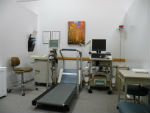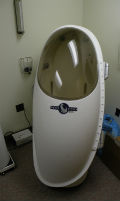Cardiopulmonary exercise (CPX) test:

In this sensitive but non-invasive stress test, subjects exercise on a treadmill to maximal exertion, while their expired air is collected and evaluated to determine peak oxygen consumption. Trained personnel monitor the subject’s electrocardiogram (ECG), blood pressure and perceived exertion. The results provide an assessment of the subject’s fitness level and cardiovascular response to exercise stress.
Resting metabolic rate (RMR) test:
This test measures the amount of energy the body uses while at rest. During this procedure, the participant lies down for 40-50 minutes while a large, clear plastic hood is placed over his/her head and neck. A metabolic cart collects and analyzes exhaled air while the participant breathes freely.
Oral glucose tolerance test (OGTT):
The OGTT is a standard clinical procedure for those at risk for diabetes. A venous catheter is placed in the subject’s arm and baseline blood samples are taken. Subjects then drink a glucose solution followed by additional blood draws taken at specific times following the glucose consumption. The OGTT provides a robust measure of glucose tolerance, such as glucose area under the curve, and insulin sensitivity via the Matsuda formula and/or insulin area under the curve.
BODPOD body composition test:

This test requires the participant to sit in a BODPOD® chamber which uses air displacement to measure one’s body volume. Through a series of calculations, the participant’s fat mass, lean body mass and percent body fat are determined. Spandex clothing and a swim cap are required and will be provided by the study staff. Body circumference and skinfold measures can also be obtained.
Intravenous glucose tolerance test (IVGTT):
The IVGTT procedure evaluates carbohydrate metabolism and insulin sensitivity. Glucose and insulin are administered through a catheter in each arm, with blood samples drawn at specific time intervals over a three-hour period.
Muscle biopsy services:
This outpatient surgical procedure removes a small muscle tissue sample via needle or small incision while the subject is under local anesthetic. Muscle biopsy services can provide tissue for multiple types of assays including muscle histology, protein, DNA, gene expression and metabolic analyses.
Phlebotomy services:
Trained nursing staff can collect blood samples for analysis or provide IV placement services.
mHealth (Wearable) physical activity monitoring services:
The HPT Core offers various wearable devices to monitor subjects’ physical activity levels on a continual basis in a real-world setting. Frequently used devices include Actigraph accelerometers, Garmin wristbands, or FitBit tracking devices.
